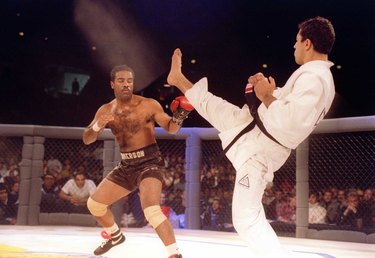
Jiu jitsu is a martial art from Japan that focuses on grappling. Practitioners use throws and locks to defend themselves in the street, or to defeat an opponent in competition. Studying jiu jitsu provides students with physical and mental benefits. Some of these benefits are common to all martial arts, while others are specific to training in "jits."
Physical Conditoining
Video of the Day
Jiu jitsu training is more rigorous than many other martial arts, owing to the intensely physical nature of grappling. A typical session includes cardiovascular training, stretching, breathing work and a resistance workout; the latter is derived from working with a resisting opponent approximately your size. These sessions build your strength and endurance, and increase flexibility.
Video of the Day
Falling Skills
Jiu jitsu students throw, sweep and trip each other dozens of times during every class. To make it through training without injury, beginning students learn how to fall down without getting hurt. This training translates easily into life outside the dojo. "You're unlikely to ever have to use self defense techniques on a bad guy, but there's a good chance that you'll fall down at least once this year," writes martial arts instructor Jason Brick in the February, 2011 issue of "Black Belt Magazine."
Self-Defense
Battlefield techniques form the basis of all jiu jitsu training. What you learn in this martial art is applicable if you are ever attacked. Skilled jiu jitsu practitioners are capable of defending themselves -- and those they love -- from a dangerous assailant. Acquiring such skill requires long years of practice, but it is one of the benefits that most strongly attracts people to the martial arts.
Patience and Discipline
An impatient jiu jitsu player is an unsuccessful jiu jitsu player. This is because timing and rhythm are vital to the physics behind jiu jitsu technique. Executing a lock or throw at the right moment feels effortless; forcing one at the wrong time is next to impossible. Practicing in this context builds patience and self-discipline, and helps reduce stress.
Fun
A typical jiu jitsu session includes exercising to near exhaustion, becoming frustrated with complex techniques and accumulating a moderate collection of dings and bruises. Despite this -- or perhaps because of it -- jiu jitsu is fun. "Doing things you enjoy can extend your lifespan, and make your life more worth living," says Dr. Mehmet Oz in his book, "You: The Owner's Manual."